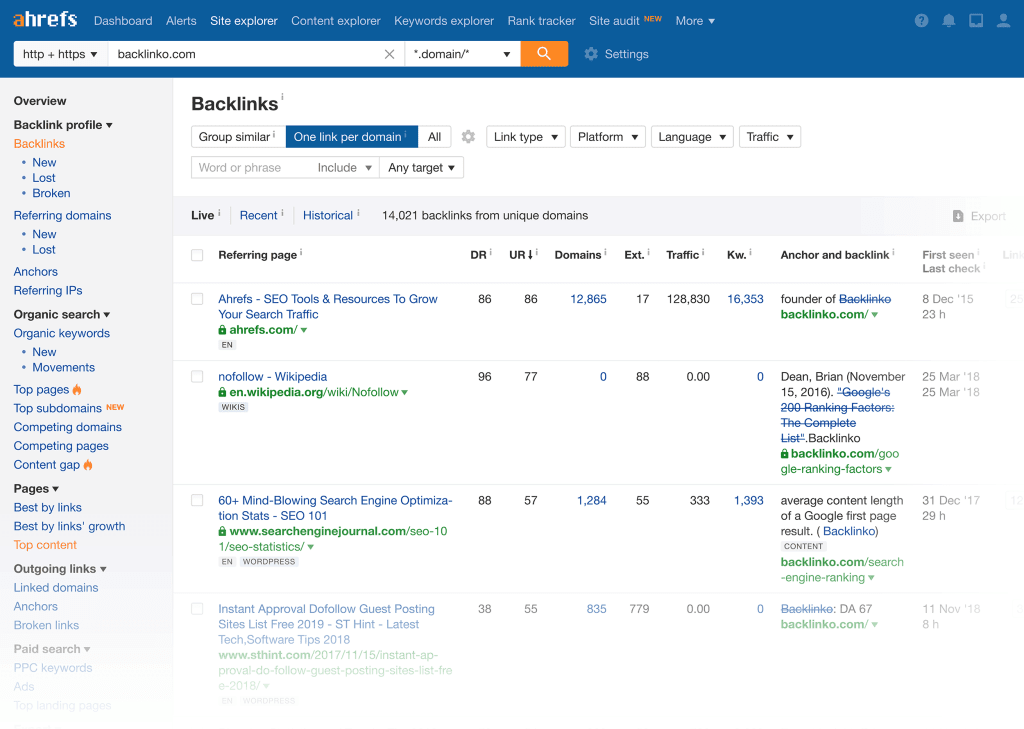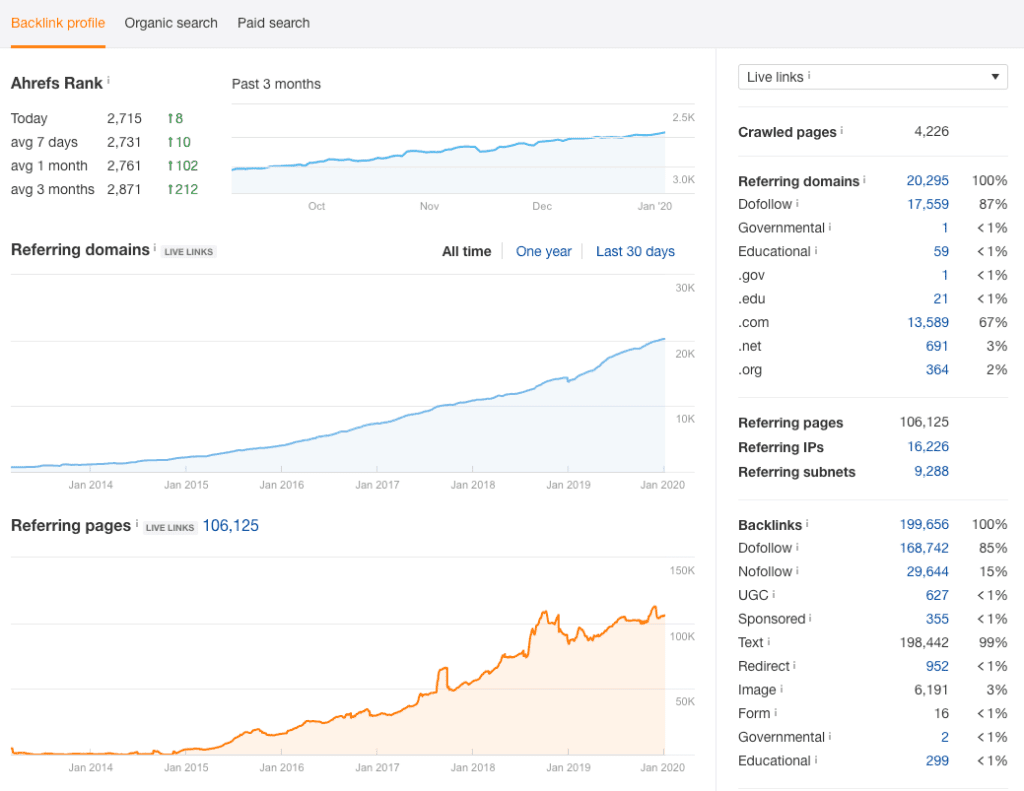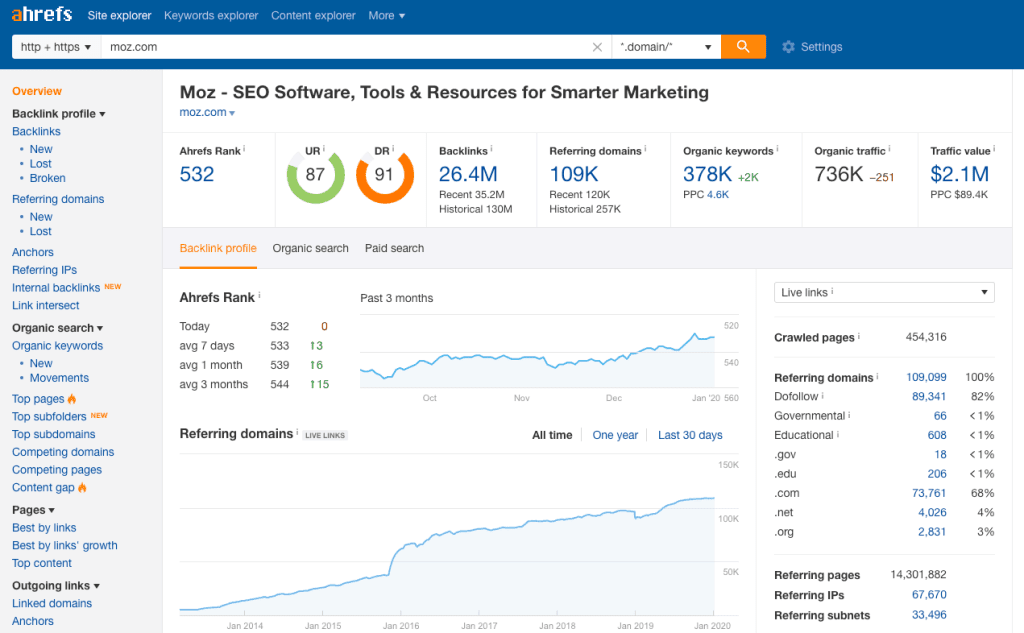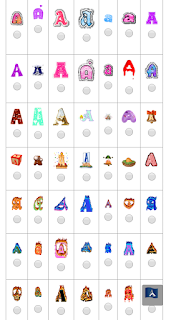Looking for the most comprehensive SEMrush vs Ahrefs review? You’re in the right place.
Whenever someone struggles to boost their sales, I recommend them to focus on improving their search engine traffic.
SEMrush is probably the world’s #1 most used SEO toolkit which is used by over 4 million people worldwide and
semrush pricing plans start at $99.95 per month whereas Ahrefs is the suite of SEO tools where they offer pricing plans start at $99 per month.
Dashboard Overview of SEMrush & Ahrefs
Here’s how the SEMrush dashboard looks like;
From domain overview to keyword overview and backlink analysis, SEMrush offers you an in-depth overview of any domain.
Here’s how the Ahrefs interface looks like;
As you can see above, from Site Explorer to Content Explorer and Keywords Explorer, you can find a ton of data at one place.
Verdict:
When it comes to the overview of dashboard, Ahrefs looks simple and easy to use even for beginners whereas SEMrush takes some time for beginners to get used to it.Everthing you need to know
.GET 7 DAY SEMRUSH TOOLS FOR FREE
SEMrush vs Ahrefs: Which Is Better for Keyword Research?
Most people invest money in paid SEO tools like Ahrefs or SEMrush for finding profitable keywords for their PPC and search campaigns. So let’s talk about the ability to find better keywords using both these tools.
SEMrush for keyword research
Here’s how their keyword tool looks like;
As you can see above, SEMrush keyword research is offering a wide range of features including;
For now, let’s use their regular keyword research tool.
As you can see above, for our example keyword “fitness tracker” SEMrush keyword research tool is offering us a ton of data including;
SEMrush also gives you a ton of phrase match keywords along with related keyword ideas.
So if you’re looking to target phrase match keywords, you can click on View full report to find a list of keywords that contain your “focus keyword phrases”.
Otherwise, you can simply go through their list of related keywords (if you’re searching for LSI keywords in general) to come up with a ton of keyword ideas that are relevant to your primary keyword.
Keyword difficulty: SEMrush keyword tool also lets you easily find out how difficult it is to rank for a particular keyword. Their keyword difficulty score is a percentage from 0 to 100 and the higher the percentage, the more difficult it would be to rank for.
Here’s how it looks like;
As you can see above, for every keyword, you will see its Difficulty, Volume, Results, Trend and SERP source.
PPC ad research: If you’re looking to find and analyse your competitors ad copies, SEMrush is a great choice. Here’s where SEMrush easily outranks other tools like Ahrefs.
For our example keyword i.e “fitness tracker”, here are the ad copies (which are live updates).
So if you’re looking to invest money in PPC and Google Ads, SEMrush keyword tool gives you a ton of ad copies ideas so you can tweak your ads (titles, meta description) accordingly.
It also offers you Keyword Magic tool where you can find even more useful data.
If you’re looking to explore niche topics and find semantically related long tail keywords in your niche, Keyword Magic Tool can be a great fit for you.
Ahrefs for keyword research
Ahrefs offers a tool called “Keywords Explorer” for keyword research.
Using Keywords Explorer, you can get thousands of relevant keyword ideas with accurate Search volume, Keyword difficulty score and advanced metrics like Clicks, Return rate and so on.
To start, click on Keywords Explorer and enter any keywords of your choice.
You can also pick your desired country (for instance, United States) and click the search button to begin your keyword research.
As you can see above, you will instantly get a ton of useful keyword data including;
- Keyword difficulty (KD) score (Under each KD score, you’ll see the estimated number of links from different sites you need to rank on the first page for that particular keyword)
- Search volume (you can also see global volume which includes searches from all countries)
- Organic Clicks that are getting for that particular keyword
- CPC value of the keyword
Quick tip: Check the Keyword Difficulty of any keyword before you decide to target it. Keyword Difficulty estimates how hard it will be to rank in the top 10 for a given keyword. It’s scored on a scale from 0 to 100 (100 being the hardest).
If you want more keyword ideas that are related to your primary keyword, you can choose from one of seven different keyword ideas reports.
Here’s how it looks like;
As you can see above, you’ll find several keyword ideas to mine more keywords. You’ll also find parent topic for your desired keyword. In our example, “Apple watch deals” is the parent topic for our example keyword i.e “apple watch discount”.
Here’s the breakdown of these keyword ideas;
- All keyword ideas (includes all terms)
- Phrase match (includes phrases that contain your target keyword )
- Having the same terms (includes ideas that contain all the terms in your target keyword)
- Also rank for (includes keywords the top-ranking pages for your target keyword also rank for)
- Search suggestions (includes queries suggested via ‘autocomplete’ when searching for your target keyword)
- Newly discovered (includes search queries that were recently added to our database)
- Questions(includes queries phrased as a question)
Here’s the list of keyword ideas when you scroll down;
When coming up with new keyword ideas, make sure to check the number of clicks for the particular keyword you’re targeting. For example, the keyword “gaming” gets ~140,000 monthly searches, but only 30,000 clicks.
But when you take the example of the keyword “gaming music,” it gets nearly 200,000 monthly searches and over 160,000 clicks.
So make sure to focus on finding those keywords that generate more clicks from Google search. That way, you can increase your search traffic even if you’re ranking somewhere in the first page (more search traffic if you’re ranking in top 3 search results).
Verdict:
Both SEMrush and Ahrefs are great tools for keyword research. Ahrefs is great for organic keyword research (which also provides you a ton of useful metrics like clicks, parent topic, keyword ideas etc) whereas SEMrush offers you an all-in-one keyword tool that helps you with both organic content research and PPC ad research.
So if you’re looking to find better keywords for both organic and paid search results, SEMrush should be your choice.
Between SEMrush and Ahrefs: Which Is Better for Backlink Analysis?
Now, let’s talk about how you can perform in-depth backlink analysis using both SEMrush and Ahrefs.
SEMrush for Backlink Analysis
It offers you a tool called Backlink Analytics which helps you easily discover backlinks of any website in the world.
Just enter any domain or your competitors URL in the Backlink Analytics tool (which you can find under
“Link Building” section on SEMrush).
Here’s how it looks like;
Enter any domain and click on check it to perform a detailed backlink analysis of the particular domain.
SEMrush backlink analytics tool instantly shows you an in-depth overview of the corresponding backlink profile.
Have a look;
As you can see above, you’ll find a ton of useful backlink data including;
- Total number of links
- Referring domains
- Referring IPs
- Authority score
- New and lost backlinks
Find your competitors backlink sources: When you click on “Backlinks” tab, you’ll find a list of all the backlink sources of your competitors.
Here’s how it looks like;
You can use filters like “Follow” to find a list of all the dofollow links of any domain in the world. That way, you can use different link building strategies like guest posting, blogger outreach, broken link building etc to build links from those sources.
Find more relevant competitors: One more incredible feature of SEMrush backlink analysis is that you can also find relevant competitors for your entered domain.
For example, here are the competitors for the site Neil Patel.
As you can see above, you can easily find all the relevant competitors and when you click on those links, you can again get their backlink data. That way you can keep on analysing backlink profiles of all the relevant sites in your industry.
Ahrefs for Backlink Analysis
Ahrefs offers a tool called “Site Explorer” to analyse backlinks (or traffic) of any website.
Here’s how it looks like;
As you can see above, you will find backlink data including;
- Ahrefs Rank
- Total number of backlinks
- Referring domains
- Organic keywords
- Organic traffic for your entered domain
- Traffic value and so on
Find backlink sources: If you want to find all the backlink sources of a particular domain, simply click on “Backlinks” section under Site Explorer.
Have a look at the data;
You can also find new and lost backlinks of any particular domain (as seen above). You can also choose filters like “dofollow” links to find all the dofollow links of any of your competitors.
Detailed backlink profile analysis: Once you scroll down, you’ll also find a detailed backlink profile of your entered domain which looks like this;
You will find backlink data including;
- Referring domains
- Referring pages
- Dofollow links
- Gov links
- Edu links
- Total number of crawled pages and so on
Top anchors text: If you want to discover what are all the anchors used for your competitors backlinks, you can easily find that from Ahrefs backlink profile.
Have a look;
As you can see above, Backlinko site has majority of the anchors coming with a similar site name and also a good percentage of anchor texts coming with Brian Dean (who is the founder of the blog and a well-known SEO expert).
Verdict:
When it comes to backlink analysis, both SEMrush and Ahrefs are great. But here’s the thing: SEMrush offers you an exclusive tool for backlink analysis whereas Ahrefs doesn’t have an exclusive backlink research tool as it comes in-built with their Site Explorer.
Between SEMrush And Ahrefs: Which Is Better for Competitor Research?
So far we discussed both keyword research and backlink analysis using these amazing two tools. Let’s now talk about how you can conduct an in-depth competitor analysis to find better opportunities to increase your traffic and sales in 2020.
SEMrush for Competitor Research
SEMrush offers an exclusive tool called “Competitive Research” which helps you easily analyse any competitors domain in the world.
Just enter any domain to start analysing.
Here’s how the domain overview looks like;
As you can see above, we took an example of Moz domain and the domain overview from SEMrush shows us the information including;
- Organic search traffic
- Paid search traffic
- Backlinks
- Display ads
When you click on each one of them, you’ll be taken to the appropriate data (such as their backlink profiles, paid ads, organic keywords etc) where you can find even more information.
You’ll also notice that the tool is offering engagement metrics of the site which include the average duration, bounce rate, average pages per visit. That means, SEMrush is literally working for you as a Google Analytics tool so you can spy on your competitors user metrics easily.
Keywords by country: It also lets you easily find your competitors top performing organic and paid keywords by country.
You’ll also notice above that, you can see the traffic trend and analyse what keywords are generating more traffic (that way you can target the RIGHT keywords to improve your traffic from search engines like Google).
Top organic keywords and competitors: Want to discover your competitors top performing keywords?
SEMrush competitor research tool provides you all that information.
You can easily discover all the top organic keywords along with main organic competitors and see their positioning map for easy analysis.
Top paid keywords and competitors: You can also take a look at all your competitors paid keywords along with their paid competitors in search.
Ahrefs for Competitor Research
Ahrefs offers “Site Explorer” tool for performing competitor research.
Enter any domain of your choice to analyze their site.
Let’s take an example of Moz.
Here’s how the detailed overview of the domain looks like;
From backlinks to organic traffic to paid search, you can find almost every detail about your competitors.
Organic search results: You can also use Ahrefs Site Explorer to discover your competitors organic search results.
Here’s how the data looks like;
Organic search analysis helps you find organic traffic, organic keywords along with the list of top countries that are sending your competitors more traffic.
Paid search results: Similar to SEMrush, you can use Ahrefs Site Explorer for finding your competitors paid search results.
Here’s how it looks like;
As you can see above, you can see the top 5 ads along with PPC ads information from the last 1 year or last 30 days or all time.
All in all, Ahrefs is great for competitor research as you can find ad copies along with top 10 competitors for any domain.
Verdict:
When it comes to competitor analysis, SEMrush is exceptional as it literally can be used as a Google Analytics tool to steal your competitors top performing keywords, paid ads, backlinks and so on. Ahrefs is great if you want to estimate any domain’s traffic and analyse their paid and organic search results.
SEMrush and Ahrefs Pricing: Which Tool is Best Bang for Your Buck?
Both SEMrush and Ahrefs are priced at similar pricing points as SEMrush plans start at $99.95 per month whereas Ahrefs plans start from $99 per month.
SEMrush is currently offering 3 pricing plans.
- Pro (starts at $99.95 per month and best for starters)
- Guru (starts at $199.95 per month and best suited for small businesses)
- Business (starts at $399.95 per month and best suited for agencies)
Here are the pricing plans of SEMrush.
All SEMrush plans offer you a 7 day money-back guarantee. You can upgrade/downgrade or cancel your account whenever you want.
Ahrefs is offering 4 pricing plans which are listed below.
- Lite ($99 per month, great for beginners)
- Standard ($179 per month, great for bloggers)
- Advanced ($399 per month, great for SEOs)
- Agency ($999 per month, suitable for agencies)
Here are the pricing plans of Ahrefs.
For your monthly subscription on Ahrefs plans, you have 48 hours to ask for a refund.
When it comes to pricing, both these tools have similar pricing plans and the most expensive plan of Ahrefs costs you $999 epr month whereas the most expensive plan from SEMrush costs you $395.95 per month.
Do they offer any free trials?
SEMrush is a clear winner when it comes to offering free trials to its users as you can grab their 30 day free trial of SEMrush Pro account using the below link.
Ahrefs doesn’t offer any free trial. You can use the below link to try their 7 day trial by paying $7.
Click here to try Ahrefs 7 days for $7
When it comes to free trials, SEMrush wins the race (without a doubt). Ahrefs doesn’t offer free trial whereas you can grab 30 days free trials with SEMrush.
What Makes SEMrush So Incredible?
Every now and then a new tool comes into the market and changes the game completely.
SEMrush is one such game changing SEO tool. It’s one of the widely used and highly recommended SEO tool on the web right now.
So now let’s talk about why you should use SEMrush over other SEO tools.
Before discussing about its features in detail, let’s quickly find out few of their most incredible benefits.
SEMrush offers the following benefits:
- You can do competitor’s analysis
- You can find the most profitable keywords (no matter what niche you are in)
- You can find and fix all your site issues
- You can do site audits
- You can do domain comparison
- You can find link building opportunities
- You can find the traffic of any site and so on



































Well i have got cleared a information about Ahrefs&SEMrush tools.But i think Ahrefs tool is best for getting more traffic to our website.Good Article,Keep Working.From SEmrush Review
ReplyDeleteThank you for Amazing Article. Really This Will Help me For while I am Selecting Hosting. From SEmrush Review
ReplyDelete